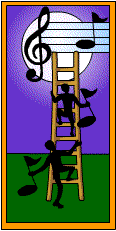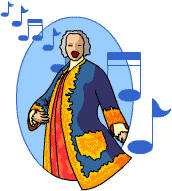The beginnings of written music
Created | Updated Oct 25, 2002

Music is one of the few things that is found throughout our history and throughout all country's in the world.From the drum's of Africa to the World's finest opera's.
Music includes all members of our society,from nursery rhymes for babies and young children to the old classics such as Tschaikowsky,Vivaldi and Chopin.`With many different types and styles in between .
But how did it evolve into the written form? One person had alot to do with the way that music is now written and performed and this is just a piece of his story.
Guido of Arezzo
The singing master at the Benedictine Monestery of Pomposa in Italy was to be the first to devise a system of notation in order to simplify teaching his choir to sing in tune. After repeatedly failing to get them to do so from the old methods of listening and repeating what was sung.
He lived from c990-c1033 and in devising the new method he earned the name Beatus Guido, inventor musicae Saintly Guido,
father of music.
He named the notes after the first syllables from six lines of a Hymn to St John the Baptist.
Ut from Ut queant laxis. Re from Resonare fibris. Mi from Mire gestorum. Fa from Fa muli tuorum. So from Solve polluti. La from La bii reatum.
Each syllable stands for a note in the scale but from 1600 Ut was renamed Do and at about the same time another syllable was added Si from Sancte Ioannes.
Guido's idea and invention revolutionised music. It was brilliant and yet simple.
He placed the notes on lines or stave and sometimes he placed the notes between the lines so the relationship between the notes could clearly be seen.
Music as it is written has two functions.
1, It locates the pitch of each note.
2, It shows how long the note should be played for.
As Guido's fame spread he took refuge in a monestery in Arezzo,Italy and it was from there that the Pope summoned him to Rome to demonstrate his methods.It was highly successful and with the backing of the church his methods were introduced worldwide.

So next time you listen to music just think,without Guido and his invention, instead of singing along you could have been running away with your fingers in your ears.
